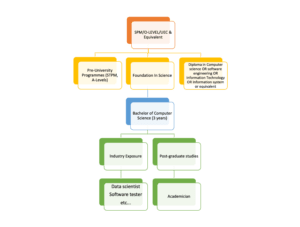Bachelor of Computer Science(N/481/6/0838)(01/29)(MQA/PA 15140)

BACHELOR OF COMPUTER SCIENCE
Have you always wanted to build the next big tech startup? A degree in Computer Science might pave the path towards the sphere of technology.
From the movies you watch on your smartphone during boring LRT rides to the functioning of the entire LRT system, the use of computer science has become second nature to our daily lives.
Even your favourite apps such as Instagram, Grab, and Waze requires computer science to exist. And that’s not all.
The algorithms and computer models in computer science are helpful in almost every field, including medicine (MRI scans to diagnose diseases), linguistics (computers to recognise speech), and economics (models to forecast economic conditions).
A Computer Science Degree will equip you to become a competent software developer and programmer.
You will gain all aspects of computing such as web and software development, mobile computing, interface design, and system administration. Computer science is closely concerned with knowing – in detail – how computers and computer systems operate.
When you have completed this programme, you could embark on exciting careers such as Applications Developer, Database Designer, E-Business Consultant, IT Consultant, Network Engineer, Programmer, Software Developer, Software Engineer, Systems Analyst, Systems Developer, and Technical Support Engineer.
Programme Outline
Year 1 Sem 1
- Computing Mathematics
- Computer Organisation and Architecture
- Programming Technique
- Operating Systems
Year 1 Sem 2
- Python Programming
- Object-Oriented Programming with C++
- Discrete Structures
Year 2 Sem 1
- Artificial Intelligence and Intelligent Agents
- Networking and Communications
- Software Development Fundamentals
- Project Management & Finance
- Social Issues and Professional Practice
- Information Management
Year 2 Sem 2
- Software Engineering Methods
- Parallel and Distributed Computing
- Information Assurance and Security
- Elective- 1
- Elective- 2
- Elective- 3
Year 3 Sem 1
- Human-Computer Interaction
- Algorithms and Complexity
- Elective- 4
- Elective- 5
- Elective- 6
- Final Year Project Phase-I
Year 3 Sem 2
- Embedded System Fundamentals
- Graphics and Visualisation
- Elective- 7
- Elective- 8
- Elective- 9
- Final Year Project Phase-II
Elective subject (Artificial Intelligence)
- Machine Learning
- Applications of Deep Learning
- Natural Language Processing
- Neural Networks
- Statistical Modelling and Data Analysis
- Internet of Things (IoT)
- E- Commerce
- Robotics
- Data Warehouse Manager
- Digital Image Processing
- Law in Intelligent System
Elective subject (Data Analytics)
- Data Mining
- Introduction to Big Data
- Statistical Modelling and Analysis
- Applications of Deep Learning
- Internet of Things
- Database Management System
- E-Commerce
- Investigation in Data Analytics
- Data Structures
- Data Base Security
- Data Warehouse Manager
Elective subject (Cyber Security)
- Cryptography and Network Security
- Internet of Things
- Cloud Computing
- Wireless Communication for 5G
- Web Technology
- Digital Forensic
- Ethical Hacking
- Security Audit and Assessment
- Software Security Assurance
- Firewall and Intrusion Detection
- E-Commerce
Special Semester
- Industrial Training (24 weeks)
1. A pass in matriculation or foundation studies with a minimum CGPA of 2.00 and credit in Mathematics and any one of the Science, Technology or Engineering subjects at SPM level or its equivalent;
OR
2. A pass in STPM with a minimum grade C (GPA 2.00) in any two subjects and a credit in Additional Mathematics at SPM level or its equivalent;
OR
3. A diploma in Computer Science OR software engineering OR Information Technology OR Information System or equivalent with minimum CGPA of 2.50 and a credit in Additional Mathematics at SPM level OR its equivalent. Candidates with CGPA below 2.50 and above 2.0 with a credit in Additional Mathematics at SPM level or its equivalent may be admitted subject to a rigorous internal assessment process;
OR
4. Any other diploma in science and technology or business studies with a minimum CGPA of 2.50 may be admitted subject to rigorous assessment process and credit in Additional Mathematics at SPM level or its equivalent.
- Data scientist
- Software tester
- Web developer
- Product manager
- Network architect
- Software engineer
- Software developer
- Full-stack developer
- Mobile application designer or developer
- Research and development (R&D) scientist
- Computer scientist or computer science researcher
- Engineering manager
- User interface designer
- Database administrator
- Cloud computing engineer
- Information security analyst
- Computer science professor
- Chief information security officer
- Software quality assurance manager
- Information technology specialist
- Artificial intelligence and machine learning engineer
- Systems analyst
- Business analyst
Upon completion of the Bachelor of Computer Science degree programme, graduates should be able to:
- Acquire knowledge, facts, concepts, principles, and theories relating to computer science.
- Analyse algorithms and techniques to design and optimize computing solutions.
- Adapt appropriate methodologies and techniques for modeling, designing, developing, and evaluating computing solutions.
- Communicate and interact effectively with diverse stakeholders.
- Utilise digital and numeracy skills for problem-solving in the field of study.
- Demonstrate leadership, teamwork, accountability, and responsibility in delivering services related to the field of study.
- Commit to principles of lifelong learning in academic and career programmes.
- Apply entrepreneurial mindset in delivering solutions under changing industry landscape.
- Uphold professional and ethical practices in delivering services related to the field of study.
Study Pathway


